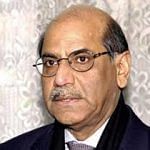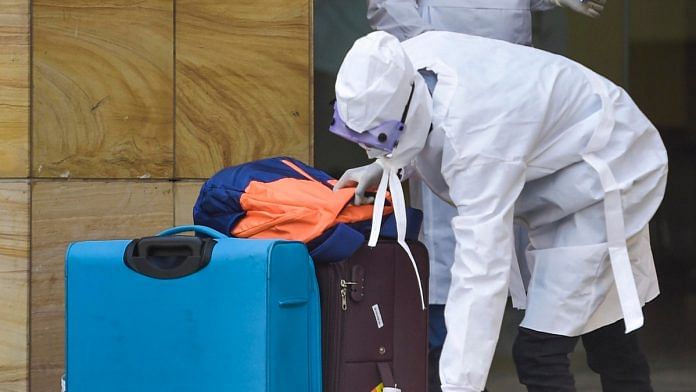 Time for a G20 summit on coronavirus
Time for a G20 summit on coronavirus
Shyam Saran | Former foreign secretary and is senior fellow, Centre for Policy Research
Hindustan Times
Saran argues that with the coronavirus outbreak the world is facing a public health and economic crisis, with major implications for global stability. “The outbreak of the coronavirus exposed how much the global economy is dependent on China for sustaining growth. It has also exposed the high level of dependency on China for the supply of key components, such as generics for the pharmaceutical industry worldwide,” he writes. He recommends holding a G20 summit to deal with the crisis.
 Many governments have made a devil’s pact with globalisation
Many governments have made a devil’s pact with globalisation
Stephen Roach | Faculty member. Yale University and former chairman of Morgan Stanley Asia
The Times of India
Roach explains how the prioritising quantity of economic growth over its quality, has led to fear and panic in the financial markets in the face of a global coronavirus pandemic.
“China, as the world’s largest producer, enjoyed a competitive edge, in part because it under-invested in its social safety net and avoided building those costs into product prices,” and this is what, Roach says, is the “devil’s pact with globalisation” — “Maximising the speed, or quantity, of economic growth while under-investing in the quality dimension of the growth experience.”
The Cost Of A Pandemic
Pravakar Sahoo | Institute of Economic Growth (IEG), Delhi
Sara Grover | St Xavier’s College, Mumbai
The Indian Express
Sahoo and Grover explain that China’s centrality in the global economy, being the second biggest economy in the world, makes the coronavirus epidemic even more acute. China’s economic relationship with India is also under threat, “China is India’s largest trading partner, accounting for 5 per cent of the country’s exports and 14 per cent of imports. India is dependent on Chinese imports in healthcare and pharmaceuticals (active pharma ingredients), smartphones and accessories, solar cells and modules and many other products”, they write. The authors add, “The disruption to India’s manufacturing supply chain may lead to shortages of finished products, higher prices and job losses”.
 Adopt a self-regulation model for tech industries
Adopt a self-regulation model for tech industries
Vivan Sharan | Technology policy expert, Koan Advisory Group
Akshat Agarwal | Technology policy expert, Koan Advisory Group
Hindustan Times
In light of the government asking OTT (over-the-top) media platforms like Netflix and Hotstar to finalise a code of conduct for their content, Sharan and Agarwal argue that the online entertainment industry should be allowed to govern itself as it will sustain creativity, ensure growth and boost revenue.
The authors note, “Self-regulation is useful because it fosters responsibility without diktats that hamper growth of new industries. The key is to allow technology industries, which demonstrate willingness to contain societal harm, to govern themselves in a transparent manner.”
 What Kejriwal should have done
What Kejriwal should have done
Annie Zaidi | Writer
The Hindu
Zaidi states that Delhi Chief Minister Arvind Kejriwal’s lack of response and status quo-ist stance during the riots in Northeast Delhi led to further spread of violence. “On the strength of the same tongue, Mr. Kejriwal could have prevented or minimised the loss of life and property in Delhi. When politicians affiliated with rival parties were making threats, he could have activated his cadre and motivated them to stand guard,” she writes.
Diplomatic denial won’t soften CAA for the world
Sudeep Chakravarti | Author of ‘Plassey’
Mint
Chakravarti comments on the Office of United Nations’ High Commissioner for Human Rights (OHCHR) filing an intervention application in the Supreme Court over the Citizenship Amendment Act. He argues that India is having a tough time replying to the arguments posed by representatives of OHCHR. He notes, “Various governments of India have displayed a patchy, even disastrous, human rights record across the country against its own citizens” but the current one functions “in a world that increasingly views India as having joined the ranks of countries where majoritarian stick is the schtick.”
 The sum and substance of the Afghan deal
The sum and substance of the Afghan deal
Rakesh Sood | Former diplomat and currently Distinguished Fellow at the Observer Research Foundation
The Hindu
Sood explains that while the US may be on its way out after the peace deal with the Taliban, this does not ensure peace to the Afghani people.
“There is no mention of what will happen to the Taliban fighters whose numbers have suddenly inflated from earlier range of 30,000 to 50,000 to 60,000 to 1,50,000. Are they to be disarmed and demobilised; prepared for civilian life or integrated with the Afghan security forces?” he asks.
 Hear the Monopolyphony
Hear the Monopolyphony
M.M. Sharma | The writer is a former additional registrar, Competition Commission of India (CCI)
The Economic Times
Sharma comments on the Competition (Amendment) Bill which is being discussed in Parliament. He explains the practices followed by regulators in various countries and notes that effect-based and object-based approach are the two practices in competition regulation. In an object-based approach, competition laws only restrict the practices of dominant players, whereas in an effect-based approach laws restrict any entity involved in monopolisation of a particular sector. Sharma calls for a “gradual shift to an effect-based approach” following the advent of Reliance Jio in the telecom sector and the very real fear that Vodafone Idea and Bharti Airtel might fold in the country.
 The current state of cooperative federalism in India
The current state of cooperative federalism in India
Pradeep S. Mehta | Writer is secretary-general of CUTS International.
Mint
Mehta comments on the reduction of revenue transfer from the Union Government to the states and the politics unfolding thereafter. Mehta notes, “Despite being a functional democracy for more than seven decades, India cannot ignore the role of the parties in power while reviewing the dynamics between various pillars of governance.” He argues politics has led to different states reacting differently to the reduction in transfer of funds. He warns that “politics must not trump economics if we are to make real progress on Centre-state cooperation”
Today’s Editorials
The Hindu: The daily calls UNHRC’s move in the Supreme Court against the Citizenship Amendment Act (CAA) an “unusual step”. It says that the Modi government may be unhappy with this “overreach”, but it should understand that the flawed structure of CAA has contributed to the present situation. The government would have to demonstrate that it is not in violation of provisions of the International Covenant on Civil and Political Rights, it suggests.
The Times of India: Different countries have chosen different attitudes in enforcing protocols to battle coronavirus but India should choose transparency over secrecy, writes TOI. While Iran is an example of how secrecy can harm the process to prevent and contain the virus, Singapore is an example of how communication and rational policy map can help keep down the mortality rate. Indian government agencies must also raise their game, it argues.
The Indian Express: Express says that the Parliament being paralysed by a standoff in this precarious moment is a “continuing scandal”. In the aftermath of these riots, institutions appear to be failing people, it says. The government must make it possible for Parliament to open its doors and talk about the violence, argues Express.
Hindustan Times: HT states that the Supreme Court’s ruling on quashing the ban on cryptocurrency by RBI is right. Blockchain has the ability to reduce the cost of cross-border transactions and the cost of remittances which is also a UN Sustainable Development Goal. The government should allow their use and work towards creating an effective regulatory regime, it writes.



